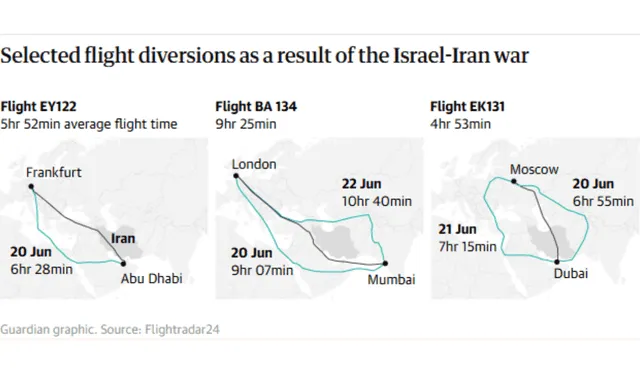US strikes on Iran push airlines to reroute flights as Middle East airspace shrinks
British Airways, Finnair and other major airlines face costly detours amid rising tensions in the Gulf region.

Due to U.S. military strikes against Iran, airlines are re-evaluating their flight routes after new safety restrictions were placed on airspace across much of the Middle East. Skinning their portion of airspace from commercial flights for a matter of days was not a decision Qatar and other countries (Qatar, Iraq, Cyprus etc) made lightly. Airlines must now figure out how to traverse as few conflict zones as possible, and commercial airlines must skirt around nations with division and in some cases airspace that has been entirely closed for military conflict.
This has all taken place while European and Asian airlines have been trying to abide by no-fly zones in the skies over Ukraine and the Russian Federation which has made finding the most efficient routes to Asia a challenge. Safety agencies have stated though that avoiding conflict zones is more important than fuel costs and time.

ALSO SEE: Iran attacks US military base in Qatar
New detours for airlines
The restriction of important air corridors means operators have to chart longer alternative routes around delicate borders. British Airways was supposed to resume service to Doha and Dubai this week but was delayed when Qatar closed its airspace overnight. Air France-KLM, and Singapore Airlines paused flights over the weekend. FlightRadar24 tracking data showed some aircraft diverting north across Georgia or diverting south around Saudi Arabia to avoid Iranian and Iraqi airspace.
John Strickland, Industry Analyst at JLS Consulting, explained that as corridors close, congestion builds. Incidentally, airlines must now juggle the various logistical and crew scheduling aspects of the operate and comply with regulations surrounding safety and working hours. Thus, adding even more costs and complexity.

Flights are experiencing route changes due to Iran's clashes with other Middle Eastern countries and the United States. Photo: The Guardian
Fuel costs and ticket prices rise
Increasing miles traveled in the air translates to increased consumption of fuel which increases costs at a time when oil has jumped sharply because of the recent strikes. Gulf-based carriers - Emirates and others - are using different routes and avoiding those impacted, while European carriers deals with a geopolitical crisis that may affect profit margins and eventually pricing in fares.
There is a robust travel demand post-pandemic, but Ryanair and others have advised ticket prices will climb this year. Even if hedging assists in delaying through to summer fares but with fuel premium now jumping significantly, consumers could end up paying higher in the end.












